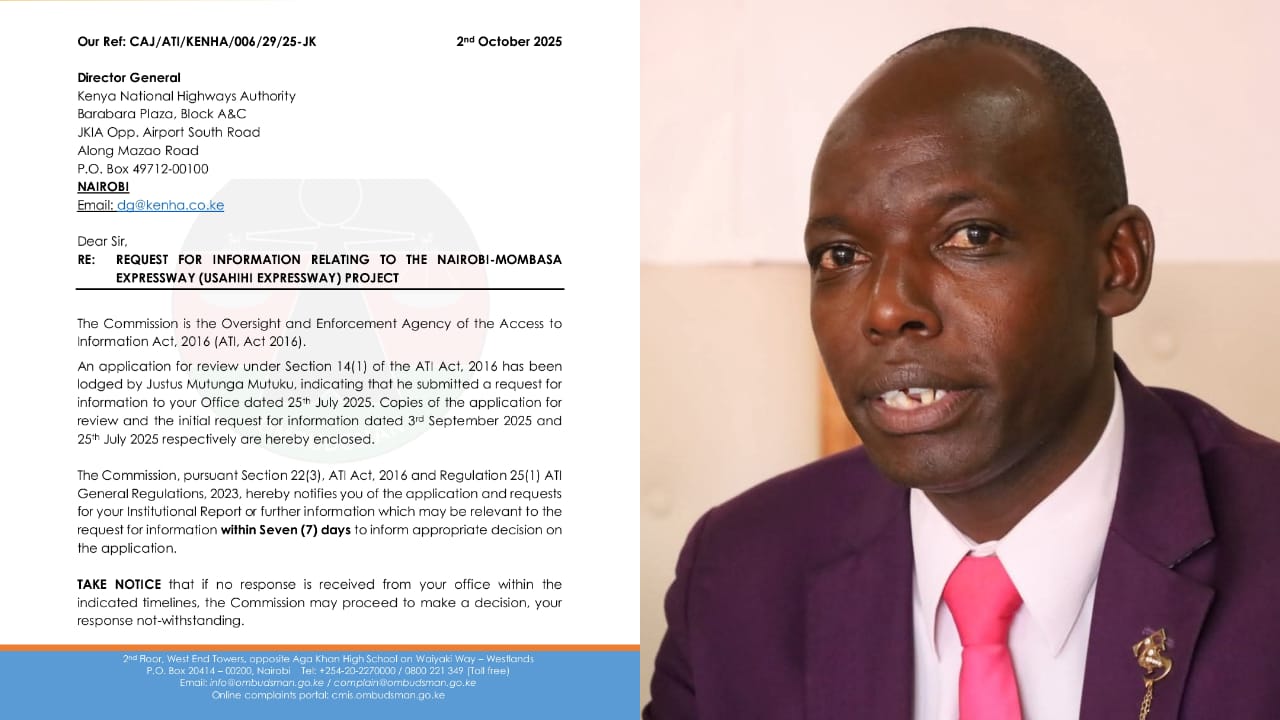 Letter by Office of the Ombudsman to KeNHA and the lead Petitioner Justus Mutuku. Photo by Andrew Mbuva.
Letter by Office of the Ombudsman to KeNHA and the lead Petitioner Justus Mutuku. Photo by Andrew Mbuva.
By Andrew Mbuva
The Commission on Administrative Justice (CAJ), popularly known as the Office of the Ombudsman, has formally written to the Kenya National Highways Authority (KeNHA) demanding a comprehensive report on the controversial Usahihi Expressway Project — a multi-billion-dollar infrastructure deal linking Nairobi and Mombasa.
In a letter dated October 2, 2025, the Commission confirmed that it had received a complaint from Justus Mutunga Mutuku, a human rights defender and Speaker of the Makueni People’s Assembly, accusing government agencies of withholding crucial information on the $3.6 billion Public–Private Partnership project.
The expressway, which stretches over 440 kilometers and runs through several counties including Makueni, is being developed under a 30-year Build–Operate–Transfer model involving the Government of Kenya, Everstrong Capital (USA), and Quickpass Ltd (Kenya).
In his earlier petition dated July 25, 2025, Mutuku argued that despite the massive public interest in the expressway, affected communities had not been meaningfully consulted. He also noted that key documents, such as the environmental and social impact reports and land compensation frameworks, had not been made public.
“This request is made not in opposition to development, but in defence of lawful, transparent, and inclusive development. The people of Makueni and Kenya at large deserve to know how such major projects are negotiated and governed,” Mutuku stated in his letter.
Mutuku’s petition calls for the disclosure of the full PPP agreement signed between the government and its partners, the Environmental and Social Impact Assessment report, the land acquisition and compensation framework, and documents detailing the vetting of the companies involved in the project.
He cited Article 35 of the Constitution of Kenya, the Access to Information Act of 2016, and other related legal provisions as the basis of his request.
Responding to the petition, the Ombudsman invoked Section 22(3) of the Access to Information Act, 2016, and Regulation 25(1) of the Access to Information General Regulations, 2023.
The Commission directed KeNHA to submit an institutional report within seven days, warning that failure to comply would result in a decision being made without the agency’s input.
“Take notice that if no response is received from your office within the indicated timelines, the Commission may proceed to make a decision, your response notwithstanding,” wrote Dorothy Jemator, the Access to Information Commissioner.
The dispute underscores growing public unease over the secrecy surrounding Kenya’s major infrastructure projects financed through PPP arrangements. Civil society organizations have long expressed concern that such deals, when shrouded in opacity, can mask corruption, environmental violations, and weak accountability.
If the Commission rules in favor of Mutuku, KeNHA and other government agencies involved — including the Public–Private Partnerships Directorate and the National Environment Management Authority (NEMA) — may be compelled to release all the requested documents in accordance with the constitutional right of access to information.
All eyes are now on KeNHA as pressure mounts for transparency and accountability in one of the country’s most ambitious and expensive infrastructure ventures.